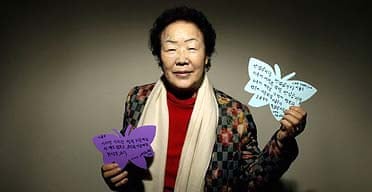Japan's prime minister, Shinzo Abe, told parliament early this morning that he would not apologise again for his country's second world war military brothels, even if the US Congress passes a resolution demanding it.
"I must say we will not apologise even if there's a [US] resolution," Mr Abe told MPs in a lengthy debate, during which he also said he stood by Japan's landmark 1993 apology on the brothels.
Last week he said there was "no evidence" that Japan had coerced as many as 200,000 mainly Chinese and Korean "comfort women" to work in military brothels between the early 1930s and 1945. South Korea accused him of attempting to "gloss over a historic truth".
An apology in 1993 by the chief cabinet secretary at the time, Yohei Kono, acknowledged that many of the women had been forced to have sex. And yesterday Hiroshige Seko, an aide to Mr Abe, had said on TV: "Though there are many definitions of coercion, prime minister Abe has said ... that he will stand by the Kono statement. He has not denied the statement."
Successive leaders have supported the statement, although most of the victims refused to accept it because it had not been approved by parliament.
Lee Yong-soo, a Korean, was 15 when snatched from her home in 1944 and taken to work in a military brothel in Taiwan. "The Japanese government is saying there was no coercion involved, but we didn't do this voluntarily," said Ms Lee, who testified at a US House subcommittee last month.
"We were taken forcibly by the Japanese. I want Japan to formally acknowledge what it did. And I want prime minister Abe to apologise to my face."
The issue threatens to sour US-Japan ties ahead of Mr Abe's expected visit to Washington in the spring. In the next few weeks Congress is due to vote on a nonbinding motion calling on Japan to "formally acknowledge [and] apologise ... in a clear and unequivocal manner for its Imperial Armed Forces' coercion of young women into sexual slavery".
Japan has refused to compensate the women, insisting that all payout claims were settled in postwar treaties with its former enemies. A fund it launched in 1995 was denounced by most of the victims as an empty gesture because it depends on private donations. A group of 120 of Mr Abe's Liberal Democratic colleagues want to water down Mr Kono's apology. "Some say it is useful to compare the brothels to college cafeterias run by private companies, who recruit their own staff, procure foodstuffs and set prices," said its leader, Nariaki Nakayama.
